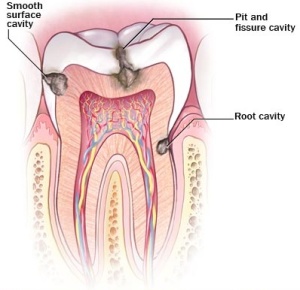By Arthur Kezian
Nobody likes being told they have a cavity, especially after the meticulous attention we’ve paid to our oral health and cleaning routines. We are taught from the time we are children to brush our teeth twice a day in order to avoid getting cavities. So why, despite good oral hygiene habits, do we get cavities? What can we do to prevent them?
Dr. Kezian will explain why cavities form and what you can do to help cavity prevention. Incorporating some of these guidelines into your dental hygiene routines will go a long way in preventing tooth cavity formation!
How Does A Tooth Cavity Form?
 Tooth cavities, otherwise known as dental caries, refer to holes formed in your tooth structure. During the ingestion and digestion process of common foods such as bread, fruit, or pasta, the bacteria that naturally reside in your mouth secrete acids. How do these acids form in the first place? Carbohydrates or starches are broken down into sugars by salivary enzymes. Well, the bacteria living on your teeth and gums love these sugars. They take these sugars and by a process known as fermentation, convert sugars into acid.
Tooth cavities, otherwise known as dental caries, refer to holes formed in your tooth structure. During the ingestion and digestion process of common foods such as bread, fruit, or pasta, the bacteria that naturally reside in your mouth secrete acids. How do these acids form in the first place? Carbohydrates or starches are broken down into sugars by salivary enzymes. Well, the bacteria living on your teeth and gums love these sugars. They take these sugars and by a process known as fermentation, convert sugars into acid.
These acids combine with your saliva and food debris and form plaques. Plaques are sticky and cling to the enamel or outer, hard, surface of your teeth. If these stay there, the acids begin to bore a hole into the enamel, thus the beginning of a tooth cavity. As the process progresses, the hole will grow deeper until it reaches the softer inner layer or dentin part of the tooth. Eventually, the cavity grows large enough to reach the pulp or inside of the tooth where blood vessels and nerves are located. The irritation of the nerves can lead to the symptoms of pain and damage to the blood vessels can actually kill the tooth.
How To Prevent Tooth Decay?
 One strategy to prevent tooth decay involves lifestyle choices. Routine dental care and a routine dental cleaning should keep the degree of plaque formation in line. However, too much acid production can lead to excess plaque development. How to lower the amount of acid production? Avoid candy and sodas because the sugars are just what bacteria use for fermentation and the creation of the acids that cause plaque formation.
One strategy to prevent tooth decay involves lifestyle choices. Routine dental care and a routine dental cleaning should keep the degree of plaque formation in line. However, too much acid production can lead to excess plaque development. How to lower the amount of acid production? Avoid candy and sodas because the sugars are just what bacteria use for fermentation and the creation of the acids that cause plaque formation.
Frequent tooth brushing, two to three times a day, using the proper techniques and toothbrush, will combat plaque formation. Adding dental floss and antibacterial mouth wash to your daily oral routine will also cut down on plaques. Finally, semi-annual check-ups are a key component to preventive dentistry. By going on routine visits to the dentist, you will receive thorough dental cleaning and polishing, as well as a comprehensive oral health exam to look for other oral cavity diseases such as gingivitis or oral cancer. A dentist will be happy to demonstrate the proper brushing and flossing techniques needed to optimize your oral hygiene.
Now that you know what to do on your own to prevent the development of cavities, make an appointment with Dr. Kezian for your routine check-ups and dental care.
Dr. Arthur A. Kezian DDS 443 N. Larchmont Blvd Los Angeles, CA 90004 (323) 467-2777
